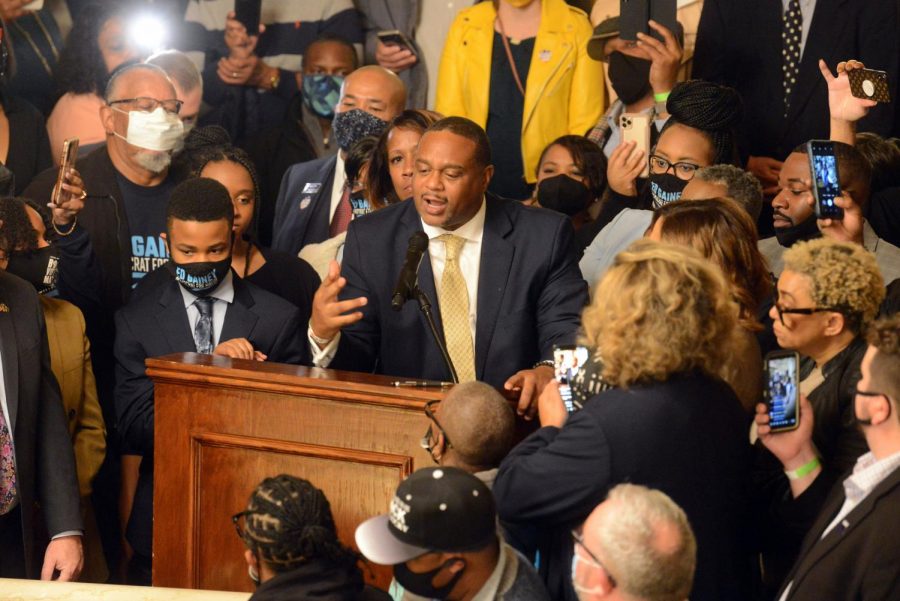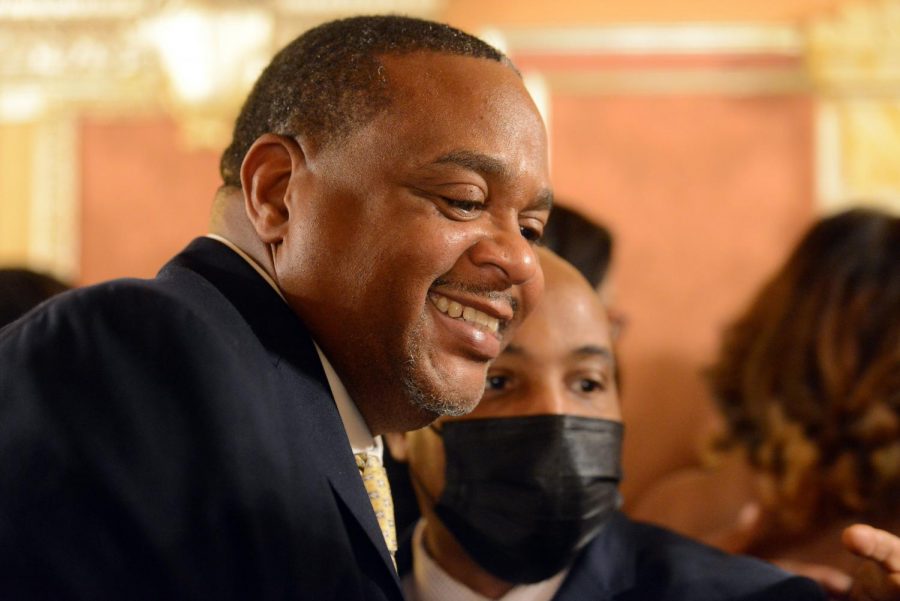Ed Gainey elected Pittsburgh’s first Black mayor in landslide election
Clare Sheedy | Assistant Visual Editor
State Rep. Ed Gainey announces his win in the Pittsburgh mayoral race on Tuesday night at the Benedum Center for the Performing Arts.
November 3, 2021
Ed Gainey, a progressive Democrat, will become the first Black mayor in Pittsburgh’s history after winning the general election in a landslide on Tuesday.
Gainey — who represents the 24th State House district, which includes parts of the City’s East End neighborhoods — defeated Republican nominee Tony Moreno, a former Pittsburgh police officer. The Associated Press called the race at about 10:45 p.m.
As of Wednesday at 1 a.m., Gainey led by more than 28,000 votes. He had about 70% of the vote compared to Moreno’s 29%. In-person voting ran from 7 a.m. to 8 p.m and the county elections office received all mail-in ballots by Tuesday at 8 p.m.
Gainey said at his election watch party event, which took place at the Benedum Center for the Performing Arts in Downtown, that he reached the mayor’s office with the help of his faith, as well as the support of the Pittsburgh community and his family — his wife, two daughters, son, mother and father. He especially credited his mother, who supported him as a single mother.
“Of how to overcome obstacles in life, so that we don’t grow old, but we grow up,” Gainey said. “And in growing up, you make the types of changes that you want to see. I wouldn’t be present without my mother.”
Gainey has served in his role in the Pennsylvania House of Representatives since 2013, and won the Democratic nomination for mayor in the May primary, defeating incumbent Bill Peduto. Moreno accepted the Republican nomination after coming in third in the Democratic primary.
Gainey thanked Moreno first for a “spirited general election” and said he wishes him and his family the best.
Moreno spoke to supporters at Station Square and said the “togetherness” he focused his campaign around will still be represented in Gainey’s time in office.
“Now, let’s get together and go forward in the future, Pittsburgh,” Moreno said. “Let’s cure these party problems. Let’s clear out the corruption. Let’s make sure that we’re all together. Let’s make sure that we don’t fight like this anymore.”
At the Gainey party, hundreds of Pittsburghers cheered in excitement and gathered around the mayor-elect. He highlighted his Pittsburgh roots, with his family being from the Hill District, him growing up on Lawn Street in South Oakland and then moving to East Liberty. Gainey — whose priorities include criminal justice reform, neighborhood and housing accessibility, environmental sustainability and youth representation in government — said he hopes the community can work together to create the “safest city in America.”
Also championing affordable housing initiatives, Gainey said he will work to ensure working class families aren’t pushed or forced out of their neighborhoods, and that Pittsburgh is a diverse city that is accessible and provides opportunity for all.
“We can have a City where our neighborhood lots are manicured and clean, where our kids don’t have to walk to school and see negativity, but walk to school and see clean positivity so when they get to the classroom, their mind can learn,” Gainey said. “‘We,’ ‘We,’ I didn’t say ‘I,’ I said we can do that.”
Gainey’s plans also include “demilitarizing” the police force and shifting those investments to new training and de-escalation strategies. He said at the event that he will work to ensure the relationship between police and residents doesn’t “divide, but unifies and multiplies.”
State Rep. Dan Frankel, D-23, said he is especially grateful for Gainey’s work in his neighboring 24th district. He said they have worked together to “put together a package of bills” that update Pennsylvania’s hate crime laws after the Tree of Life massacre, and he is eager to see what Gainey does in office in terms of affordable housing legislation, critical justice reform and more.
“We’re totally in sync, in terms of the issues that are facing the City,” Frankel said. “You know, I want to work with him to make sure that we provide him all the score we can in Harrisburg.”
Frankel said the historic election of Gainey as Pittsburgh’s first Black mayor is “an incredible moment.”
“I think it gives me hope for our City that an African American, who has been working in government for so many years, can bring his talents and the City recognizes it, even though the majority of the City is white,” Frankel said. “So that’s a great thing for Pittsburgh.”
In his speech, Gainey emphasized the importance of setting an example for children growing up in Pittsburgh. He said he wants to ensure “our children” see and get to experience the major changes Gainey and the greater Pittsburgh community wants to make for safety, the education system, diversity and more.
“Look at the image that we are showing our children,” Gainey said. “I want our children to see what a city for all looks like. I want our children to see why our City is safe and we work so hard. I want our children to see why we have a world-class education system. I want our children to see the diversity that is the new America.”
Angel Gober, regional director of OnePA, said her organization has been campaigning for Gainey. Gober said OnePA “really hit the ground hard for Ed Gainey” and increased voter turnout for this election.
“He’s very aligned with our issues. He’s been in our organization for a very long time, specifically around education, justice and ending the school to prison pipeline,” Gober said. “So it was an easy decision to support him as the next mayor.”
Gober said she is especially excited to see how Gainey focuses on funding the Pittsburgh education system, addressing environmental issues and increasing political engagement once in office.
Morgan Overton, president of Young Democrats of Allegheny County, said her organization works to elect Democratic candidates year-round. Overton, who also serves as the vice chair of the Gender Equity Commission, referenced the commission’s 2019 report that revealed that Pittsburgh is a difficult place to live in for Black women and said she hopes Gainey prioritizes the “livelihoods of Black women in Pittsburgh.”
“So I hope that he listens to Black women, I hope that he has Black women as part of his administration,” Overton, a Pitt 2016 and 2020 alumna, said. “And I want this to turn into a city where people don’t think that they have to leave in order to thrive.”
Jessie Ramey, director of the Women’s Institute at Chatham University, echoed Overton’s sentiments regarding gender equity. Ramey said she trusts that Gainey will prioritize Black women and the community will work with him to ensure that.
“I think if we lead with intersectional, justice work, that we can’t go wrong, right?” Ramey said. “So if we really put intersectionality and put Black women at the center of everything we do in Pittsburgh, and really think about who is really the most marginalized in our City and put them right in the middle of every decision we make, we will not go wrong.”
The crowd chanted “One City,” in celebration of Gainey’s victory. Gainey said everyone can be innovators and work toward change in Pittsburgh, and hopes to partner with the community to facilitate that change. Gainey said when Pittsburgh shows up, “we blow up.”
“But here’s the reality,” Gainey said. “That doesn’t start with me, because here’s why: if one man tells you they can change the city, then they’re not telling you the truth. If we partner together, if we build a city that we want to see, that’s called buy-in. Buy-in as a return for our investment that we create a city where everybody feels welcome and when we do that, we win as a people.”




